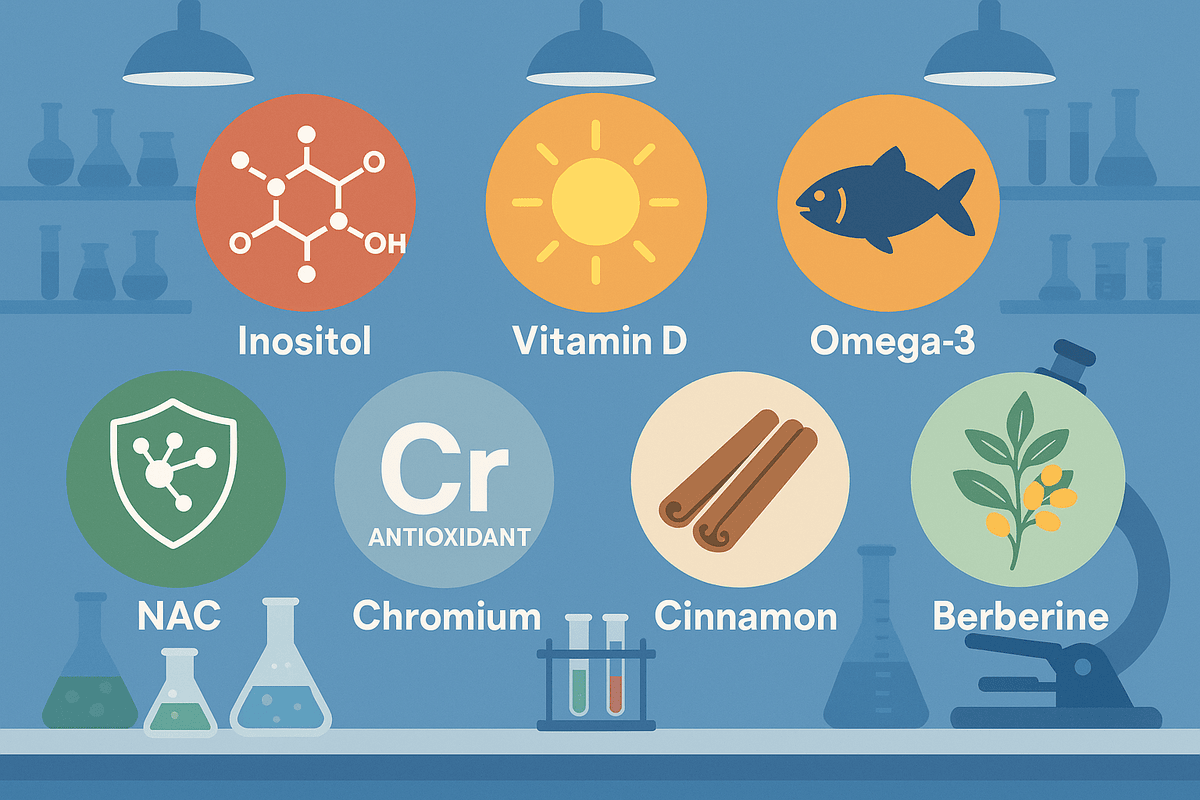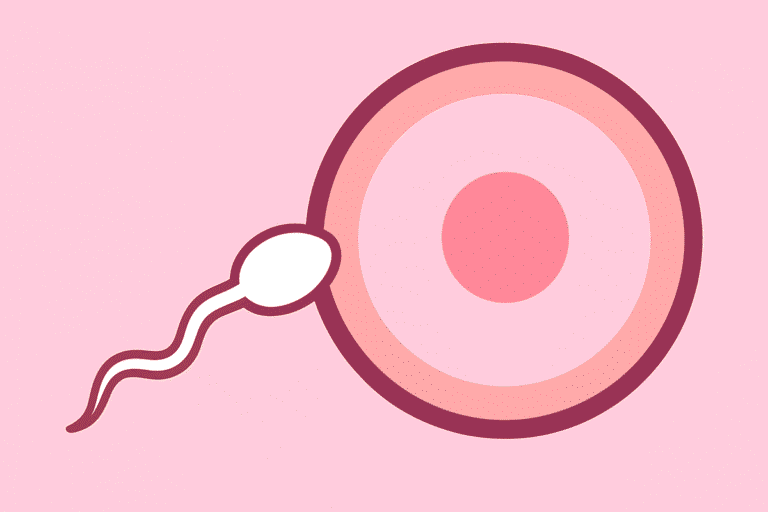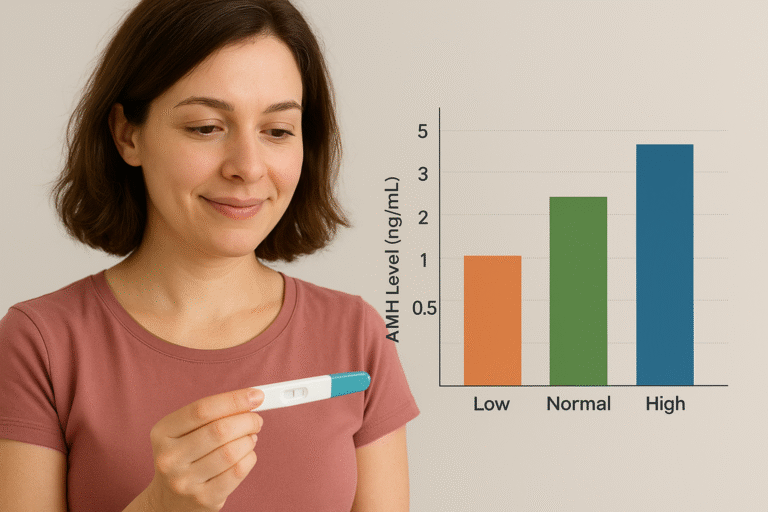People with Polycystic Ovary Syndrome (PCOS) often feel like they’re fighting an uphill battle against hormones that change all the time, weight gain that doesn’t make sense, acne, cycles that aren’t regular, and the threat of insulin resistance. Diet, exercise, and medical treatment are the most essential parts of managing PCOS, but carefully chosen PCOS supplements can also help you get better and reduce your symptoms. With so many supplements to choose from, it can be challenging to determine which ones are truly effective and supported by solid research.
This detailed guide cuts through the noise, focusing solely on the best supplements for PCOS that have strong scientific backing. We go into great detail about how these PCOS supplements work, how they can help with PCOS-related problems, including weight management, and the best ways to use them in your daily life. Find out which PCOS supplements are best for losing weight and balancing your hormones so you can take proactive, evidence-based actions to get your health back.
Understanding PCOS and the Crucial Role of Targeted Supplementation
Polycystic Ovary Syndrome (PCOS) is a complicated endocrine illness that affects millions of women throughout the world. It is marked by hormonal imbalances that can cause excessive levels of androgens (like testosterone), insulin resistance, and problems with the ovaries that can cause periods to be erratic or not happen at all. Insulin resistance is a big problem for women with PCOS, affecting up to 70% of them. Due to this metabolic issue, the body struggles to utilize insulin effectively, leading to elevated blood sugar and insulin levels. High insulin, in turn, causes the ovaries to produce more androgens, which exacerbates symptoms such as weight gain (particularly around the midsection), acne, hirsutism (excessive hair growth), and anovulation.
It is essential to deal with this insulin resistance, and this is where many PCOS supplements for weight loss and symptom management have the most significant effects. People with PCOS often have low levels of essential nutrients, which makes it much harder for their hormones and metabolism to work correctly. The goal of supplementation is to address these issues, immediately enhance insulin sensitivity, reduce inflammation, support the ovaries’ function, and help maintain healthy testosterone levels. It’s important to stress that PCOS supplements are not miracle pills. They work best when combined with lifestyle changes and the guidance of a healthcare professional who is familiar with your health history.
The Top 7 PCOS Supplements for Symptom Relief
After carefully reviewing the scientific literature, we found that these seven supplements for PCOS are regularly shown to help alleviate the main symptoms of the condition. Let’s take a closer look at each powerhouse:
1. Inositol: The Insulin-Sensitizing Powerhouse for Hormones and Fertility
Inositol is a vitamin-like substance that is typically associated with B vitamins. It is essential for insulin signalling and communication between cells. Myo-inositol (MI) and D-chiro-inositol (DCI) are two basic types. A lot of the time, people with PCOS have an imbalance in the ratio of these two types in their ovarian and metabolic tissues.
How it Helps PCOS
Inositol’s primary benefit is that it enhances insulin’s effectiveness. It helps reduce blood sugar and insulin levels by making cells more responsive to insulin. This immediately reduces the overproduction of ovarian androgens caused by insulin, making ovulation more regular, periods more regular, and acne and hirsutism less severe. Studies have consistently shown that taking inositol helps suppress testosterone levels and improve egg quality.
Improved insulin sensitivity helps reduce fat accumulation, especially visceral fat, and can lower cravings, making it easier to stick to a diet. This is true for PCOS supplements that aid with weight loss. Studies show that it can also lower signs of inflammation and enhance lipid profiles.
Scientific Evidence
Numerous randomized controlled trials (RCTs) and meta-analyses have demonstrated the effectiveness of inositol. A comprehensive review indicated that it often works as well as prescription metformin to enhance ovulation rates, regularize periods, and lower metabolic markers such as insulin and triglycerides, with fewer adverse effects. Research examining the best supplements for PCOS weight loss indicates that taking inositol can significantly reduce BMI and waist circumference.
Dosage & Form
The most studied and effective regimen combines MI and DCI in a specific ratio, typically 40:1 MI to DCI. Most people take between 2000 and 4000 mg of MI and 50 to 100 mg of DCI every day. Powder forms are widespread, and most people can handle them. Benefits typically begin to show after two to three months of regular use.
Also Read: Learn About STD Symptoms
2. Vitamin D: The Sunshine Vitamin for Metabolic and Hormonal Harmony
Vitamin D is a fat-soluble vitamin that functions more like a hormone in the body. It’s essential for the health of bones, the immune system, and, most importantly, for regulating metabolism and hormones.
How it Helps PCOS
Many women with PCOS don’t get enough vitamin D, which can make insulin resistance, inflammation, and irregular menstrual cycles worse. Supplementing can aid with insulin sensitivity, glucose metabolism, and possibly lower testosterone levels. Getting enough vitamin D is also linked to higher fertility, reduced inflammation, and improved mood control.
Vitamin D doesn’t directly burn fat, but it can help with weight management by influencing how the body functions and possibly affecting hormones that regulate feelings of fullness. It can be used as part of a comprehensive weight loss plan that includes PCOS supplements.
Scientific Evidence
Several studies show that fixing a Vitamin D deficit in people with PCOS leads to significant increases in insulin sensitivity, menstrual regularity, and androgen levels compared to a placebo. Higher levels of vitamin D have also been associated with lower BMI and improved lipid profiles in individuals with PCOS.
Dosage & Form
The amount you need to take is different for each person; therefore, it’s essential to get a 25-OH Vitamin D test. For individuals with deficient vitamin D levels, the recommended repletion doses of Vitamin D3 (cholecalciferol) are typically between 2000 IU and 5000 IU per day. After that, a maintenance dose of 1,000 to 2,000 IU is commonly administered. Always check your levels before and throughout high-dose supplementation. Vitamin D3 is the most bioavailable form. When combined with Vitamin K2 (MK-7), calcium can be utilized more effectively.
3. Omega-3 Fatty Acids (Fish Oil): Taming Inflammation for Better Hormones and Metabolism
Omega-3 fatty acids, especially EPA (eicosapentaenoic acid) and DHA (docosahexaenoic acid), are essential polyunsaturated fats that are found in large amounts in fatty fish and high-quality fish oil supplements. They are potent anti-inflammatory drugs.
How it Helps PCOS
Chronic low-grade inflammation is a major cause of PCOS since it makes insulin resistance worse, raises the risk of heart disease, and throws off hormones. Omega-3s significantly lower inflammatory indicators, such as CRP. They also make insulin work better, cut lipid levels, and may help lower testosterone levels. Studies show that they can help make periods more regular and lessen the intensity of depressive symptoms that typically come with PCOS. Because they reduce inflammation and may increase insulin sensitivity, these PCOS supplements for weight reduction are beneficial for managing weight. They may also make you feel full.
Scientific Evidence
Strong evidence suggests that women with PCOS who take Omega-3 supplements have lower triglycerides, higher HDL (“good”) cholesterol, reduced inflammatory markers, and improved insulin resistance. Several studies also show that testosterone levels go down and menstrual cycles become more regular.
Dosage & Form
Look for a supplement that gives you at least 1000–2000 mg of EPA and DHA per day. Under the right conditions, higher doses (up to 3000–4000 mg) may be used for severe inflammation or high triglyceride levels. Look for well-known brands that promise freshness (excellent oxidation stability) and purity (tested for heavy metals and PCBs). Triglyceride-form oils are frequently better at being absorbed than ethyl ester forms. Algal oil is a great vegan option.
Solution For Low Libido In Men
4. N-acetylcysteine (NAC): The Antioxidant Powerhouse for Insulin Sensitivity and Ovulation
N-acetylcysteine is a changed version of the amino acid cysteine. It’s a powerful antioxidant that helps the body produce glutathione, the most important antioxidant.
How it Helps PCOS
NAC works in various ways to support individuals with PCOS. By lowering oxidative stress that harms insulin signalling pathways, insulin sensitivity improves significantly. It has effects that block androgens, which could diminish testosterone levels. NAC may also help regulate ovulation and menstrual cycles by reducing oxidative stress and inflammation in the ovaries. Its antioxidants defend against the long-term heart problems that can come with PCOS. Although it isn’t primarily touted as one of the finest supplements for losing weight with PCOS, its powerful effect on insulin resistance indirectly aids in weight control.
Scientific Evidence
Clinical trials have consistently shown that NAC improves insulin sensitivity, lowers fasting insulin and glucose levels, lowers total testosterone, and raises ovulation rates in women with PCOS. In many cases, it works just as well as metformin. Studies also show that signs of oxidative damage and inflammation go down.
Dosage & Form
Most studies on PCOS employ doses between 600 mg and 1800 mg per day, usually split into two or three doses. Begin with a smaller dose and raise it as needed. Most people can handle NAC well; however, some people may have moderate stomach problems when they take a lot of it. You can get it in powder or capsule form.
Role Of GLP-1 Agonists in Preconception
5. Chromium Picolinate: Enhancing Glucose Metabolism and Curbing Cravings
It is a necessary trace mineral that helps break down carbohydrates and fats. Chromium picolinate is a form that is readily absorbed by the body, as it is bonded to picolinic acid.
How it Helps PCOS
Chromium’s primary role in PCOS is to enhance insulin’s effectiveness. It helps insulin bind more tightly to cell receptors, which makes cells take in more glucose and lowers blood sugar and insulin levels. This higher insulin sensitivity may help balance hormones better. Studies have shown that one of the most significant benefits is that it reduces cravings for carbs and suppresses appetite, making it a great addition to PCOS supplements for weight loss. It helps prevent energy crashes and overeating by maintaining stable blood sugar levels.
Scientific Evidence
Studies conducted only on people with PCOS have shown that taking chromium picolinate (typically 200 to 1000 mcg/day) increases insulin sensitivity, reduces fasting insulin and glucose levels, improves glucose tolerance test results, and may lead to slight decreases in body weight, BMI, and body fat percentage. Researchers have also found that appetite and cravings go down.
Dosage & Form
In PCOS studies and practice, doses of chromium picolinate range from 200 mcg to 1000 mcg per day. People should only take higher amounts under medical supervision. Picolinate is the best form for absorption. For long-term blood sugar benefits, it is essential to remain consistent.
Also Read: Complete One Month Preparatory Guide For Pregnancy
6. Cinnamon (Cinnamomum verum): A Spicy Solution for Blood Sugar Control
True Ceylon cinnamon (Cinnamomum verum or zeylanicum) is the preferred form of cinnamon to take as a supplement, as it contains less coumarin, which can be harmful in large amounts. It has bioactive molecules that function like insulin.
How it Helps PCOS
Cinnamon increases the body’s sensitivity to insulin and helps lower blood sugar levels during fasting. It slows down the emptying of the stomach and the breakdown of carbohydrates, which keeps blood sugar levels steadier after meals. This stabilization helps control cravings and helps people keep their weight in check. Its effects on androgen levels are not as strong as those of other PCOS supplements; however, its main benefit is that it improves metabolic factors important for managing PCOS.
Scientific Evidence
RCTs in women with PCOS have shown that taking cinnamon (typically 1.5 grams per day) lowers fasting blood sugar and insulin resistance (HOMA-IR), improves lipid profiles, and may make periods more regular compared to a placebo. Some studies demonstrate that they have a small impact on weight and BMI.
Dosage & Form
Try to consume 1 to 3 grams (1,000 to 3,000 mg) of Ceylon cinnamon powder or standardized extract daily. For long-term safety, make sure the source is Ceylon cinnamon. Capsules are easy to use. You can also use it a lot in drinks and food.
7. Berberine: Nature’s Metformin for Metabolic Overhaul
Berberine is a potent bioactive substance derived from several plants, including goldenseal, barberry, and Oregon grape. It activates an enzyme known as AMPK, which is frequently referred to as the “metabolic master switch.”
How it Helps PCOS
Berberine works in ways similar to the pharmaceutical medicine metformin. It makes insulin work more effectively, decreases blood sugar and insulin levels, helps the body absorb glucose, and prevents the liver from producing glucose. This directly fixes the main problem with insulin resistance in PCOS, which lowers testosterone levels, makes ovulation more regular, and makes periods more regular. Berberine is one of the most effective supplements for PCOS weight reduction, as it enhances lipid metabolism and supports weight loss. Research indicates that it can be just as effective as metformin in lowering weight and improving metabolic parameters in individuals with PCOS.
Scientific Evidence
Numerous high-quality studies and meta-analyses demonstrate that berberine is effective in managing PCOS. It significantly lowers testosterone, LDL cholesterol, triglycerides, fasting glucose/insulin, and insulin resistance, while also increasing HDL cholesterol and ovulation rates. Most importantly, it consistently shows significant drops in women’s body weight, BMI, and waist circumference who have PCOS.
Dosage & Form
The average dose is 500 mg, given two to three times a day, usually before meals, for a total of 1,000 to 1,500 mg. Because it has a limited half-life, you need to take it several times. Start with a lower dose to see how well you can tolerate it, as it may irritate your stomach (causing gas, cramps, and diarrhoea) for some people initially. It is best to use standardized extracts of high grade.
Also Read: Difference Between Low Sperm Count & Motility
Conclusion: Empowering Your PCOS Journey with Evidence-Based Support
There are several ways to deal with PCOS, and adding science-backed PCOS supplements can be a game-changer. The seven supplements listed here, Inositol, Vitamin D, Omega-3s, NAC, Chromium, Cinnamon, and Berberine, are among the best, as extensive research has shown they can help with insulin sensitivity, hormone balance, reducing inflammation, supporting ovulation, and managing weight. These are the best supplements for PCOS because they all have real, scientific ways to help with symptoms. For example, Inositol and Berberine make insulin more sensitive, Omega-3s reduce inflammation, NAC boosts antioxidants, and Vitamin D, Chromium, and Cinnamon help with metabolism.
Remember that persistence and using PCOS pills with healthy habits are essential, especially if you want to lose weight or get pregnant. Always consult with your consultant first to ensure a safe and effective customization of your plan. You can take charge of your PCOS and move toward improved health, energy, and well-being by utilizing these effective, research-backed strategies. Making wise choices is the first step on your path to balance.





[…] can lead to subfertility in women, accounting for approximately 25% of cases. Conditions like Polycystic Ovary Syndrome (PCOS) disrupt hormone balance, leading to irregular or absent periods. Other disorders such as […]